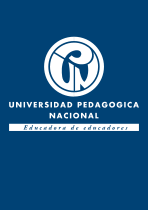Pensamiento crítico y lectura. Una mirada desde la obra de Guillermo Hoyos-Vásquez.

Citación
Fecha
2021-01-01Autor
Prieto Galindo, Fredy Hernán
Enlace al recurso
https://revistas.pedagogica.edu.co/index.php/RF/article/view/10916Keyword
ImpertinenceCritical thinking
School
Situation
Impertinência
Pensamento crítico
Escola
Situação
Utopia
Utopia
Metadatos
Mostrar el registro completo del ítemResumen
En este artículo de reflexión se propone un modelo filosófico y pedagógico de pensamiento crítico para una escuela impertinente. Para ello nos valemos de la lectura que hizo Guillermo Hoyos-Vásquez de la fenomenología, el idealismo alemán y la teoría crítica frankfurtiana para la situación latinoamericana. En efecto, el pensador colombiano ha propuesto una manera impertinente, crítica y utópica de comprender la filosofía en vistas de la educación escolar y profesional. Estas se han enfocado en satisfacer las demandas del sistema económico-político, han acudido a un concepto cognitivista de pensamiento crítico como una herramienta pertinente para el logro de nuestras utopías sociales y han ignorado el ethos de nuestros estudiantes y su situación existencial.
Abstract
In this reflective article, a philosophical and pedagogical model of critical thinking for an impertinent school is proposed. To do this, we use Guillermo Hoyos-Vásquez’s reading of phenomenology, German idealism, and Frankfurt’s critical theory for the Latin American situation. Indeed, the Colombian thinker has proposed an impertinent, critical, and utopian way of understanding philosophy in view of school and professional education. These have focused on satisfying the demands of the economic-political system, have resorted to a cognitivist concept of critical thinking as a pertinent tool for the achievement of our social utopias, and have ignored the ethos of our students and their existential situation.
Editorial
Editorial Universidad Pedagógica Nacional
Fuente
Colecciones
- Revista Folios [571]
